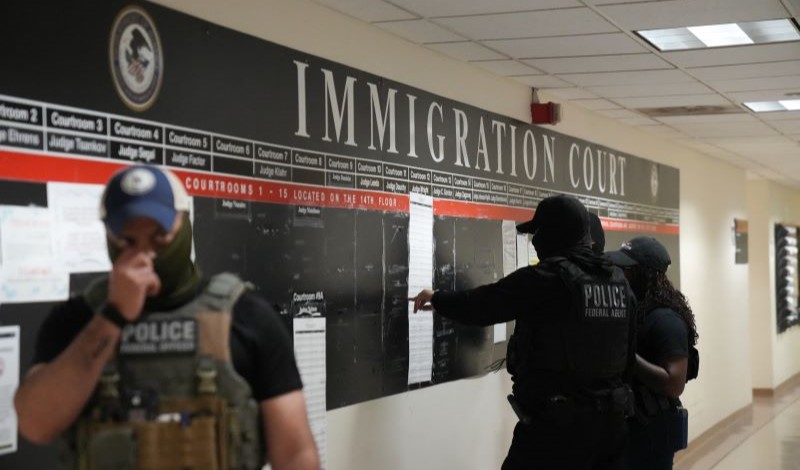
A recent court decision may help protect civil servants unlawfully removed by the Trump Administration.
The June 3 decision by the U.S. Court of Appeals for the Fourth Circuit in National Association of Immigration Judges v. Owen has the potential to remove a major obstacle to justice for the tens of thousands of government employees who have been unlawfully removed by the Trump Administration.
The case involved the rights of the 750 immigration judges (IJs) who work for the U.S. Executive Office for Immigration Review (EOIR), an agency within the U.S. Department of Justice. EOIR adopted a rule that prohibits IJs from speaking publicly on immigration matters without first obtaining permission from EOIR. It then implemented the rule in ways that almost completely precluded IJs from expressing their views. In some cases, the approval process took so long that the opportunity to address a matter in a speech or writing expired before EOIR acted on the request to speak. In other cases, EOIR denied the request to speak because the IJ planned to express views that differed from the official views of EOIR.
The National Association of Immigration Judges filed a complaint in a district court in which it argued that the EOIR rule violates IJs’ First Amendment right to free speech and their Fifth Amendment right not to be subject to unduly vague rules. The district court dismissed the action as lying outside its jurisdiction. The court relied on a provision of the Civil Service Reform Act of 1978 (CSRA) that requires civil servants who want to challenge alleged unlawful government action to file a complaint with the Merit Systems Protection Board (MSPB) and wait until after the MSPB addresses their complaint before seeking relief from a federal court.
The Fourth Circuit vacated that order and remanded the case to the district court for further consideration. The Fourth Circuit instructed the district court to reconsider its conclusion that the U.S. Congress intended to preclude district courts from exercising jurisdiction over complaints by civil servants without first allowing the MSPB to act on the complaint. Key to the Fourth Circuit’s decision was its finding that “serious questions” had arisen as to whether the MSPB continues to function as the independent adjudicatory agency that Congress intended.
When Congress enacted the CSRA, it created the MSPB as a purely adjudicative agency that would be completely independent of the President. The need for that independence is obvious. Any unlawful action that the executive branch takes with respect to a civil servant is attributable to the President. It would be totally inappropriate for an MSPB that is under the control of the head of the executive branch to decide whether the executive branch is violating the law. Congress assured the independence of the MSPB by specifying that it was to consist of three members who are nominated by the President and confirmed by the U.S. Senate, serve staggered seven-year terms, and can only be removed for “inefficiency, neglect of duty, or malfeasance in office.”
President Donald J. Trump violated the CSRA by removing a member of the MSPB without stating any cause. On May 22, 2025, the U.S. Supreme Court allowed that action to take effect. The actions of the President and the Supreme Court create a situation in which the MSPB has no power to act because, with only one member remaining, it lacks a quorum.
If President Trump declines to nominate anyone to be a member of the MSPB, it will continue to be powerless. If President Trump nominates someone to serve as a member of the MSPB and the Senate confirms his nominee, the new member will be removable by President Trump at any time for any reason. The MSPB would then bear no resemblance to the independent adjudicative body that Congress intended to create when it enacted the CSRA. It would be completely under the control of the President.
The Fourth Circuit quoted at length from a trio of opinions in which the Supreme Court had previously concluded that the CSRA deprived district courts of jurisdiction over claims by civil servants challenging alleged unlawful employment actions. The Supreme Court required a civil servant to file a complaint before the MSPB as a prerequisite to the exercise of district court jurisdiction to consider the complaint. Each of those opinions was based on the assumption that the MSPB would be independent of the President and would have the power to act on the complaint. The Fourth Circuit then explained why those conditions do not exist today.
The Fourth Circuit noted that, when deciding whether a mandatory exhaustion of administrative remedies requirement in a statute deprives a court of jurisdiction to decide a class of cases, the first step is evaluating whether application of the requirement would completely deprive, or merely delay, the complaining party of the right to access the court. When the Supreme Court held that the CSRA deprives district courts of jurisdiction to consider complaints by civil servants that the government is violating their rights until after the MSPB acts on the complaint, the Court based its decision on its belief that the MSPB had the power to act on those complaints and that the MSPB was completely independent of the President. The Fourth Circuit highlighted that those predicates for the Court’s decision no longer exist.
It is highly likely that the district court will decide on remand that the relevant conditions have changed so dramatically that the CSRA can no longer be interpreted to deprive district courts of jurisdiction to consider complaints of civil servants until after the MSPB has acted on the complaint and that the Fourth Circuit will uphold that decision. That holding would change the outcome of many other cases.
Tens of thousands of civil servants have been unlawfully removed. In many cases, they were removed en masse for alleged incompetence without any statement explaining the basis for that conclusion and without any supporting evidence. They were also not given any opportunity to contest the allegation that they were incompetent.
That is a clear violation of both their statutory rights under the CSRA and their right to due process. The only barrier to their ability to prevail in court is the judicial determination that the provision of the CSRA that requires them to file their complaints at the MSPB as a prerequisite to judicial review deprives district courts of jurisdiction. The Fourth Circuit’s actions have the potential to remove that barrier, thereby entitling the employees to reinstatement and back pay.
There may be an even easier way to avoid the jurisdictional effect of the CSRA’s exhaustion requirement. The Prison Litigation Reform Act has a similar provision that requires exhaustion of administrative remedies as a prerequisite to judicial consideration of a complaint that a prison is violating a prisoner’s rights. When the Supreme Court discovered that many prisons were abusing that mandatory exhaustion requirement, the Court responded in a way that frustrated the attempts of prisons to erect insurmountable barriers to court access.
In its 2016 decision in Ross v. Blake, the Court held that prisoners are only required to exhaust remedies that are “available.” It then said that a remedy is not “available” when “it operates as a simple dead end.” President Trump has created conditions in which the remedy of filing a complaint at the MSPB is a simple dead end. Civil servants should not be required to exhaust that remedy.




